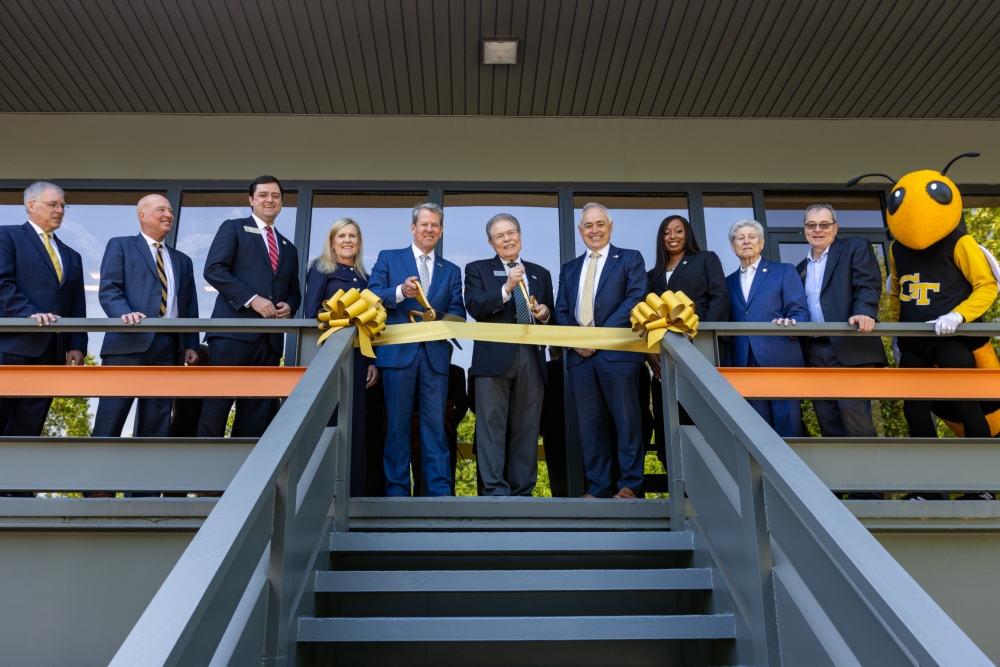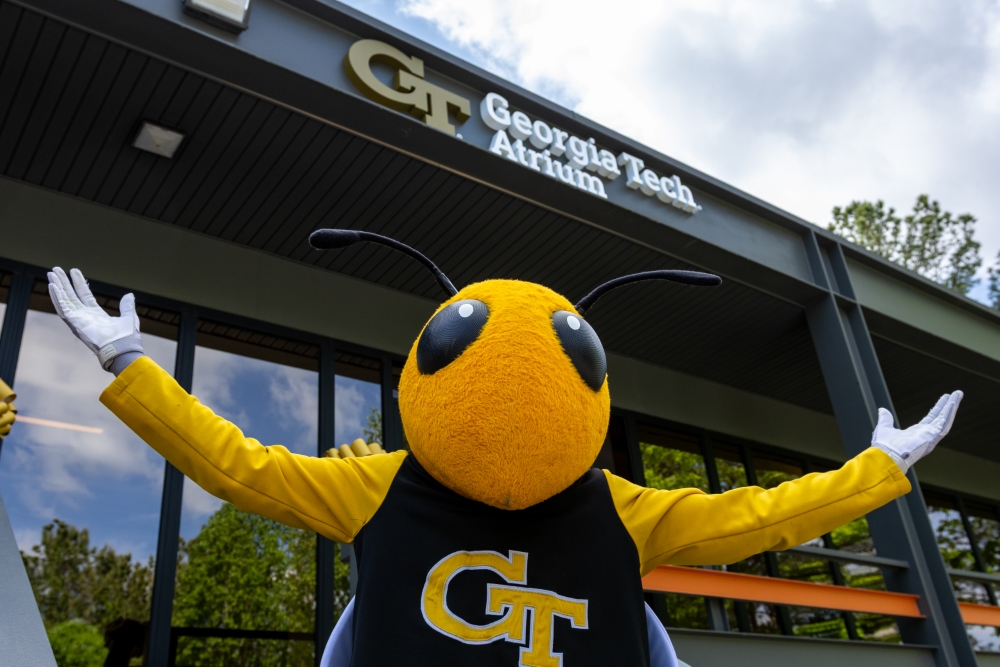Success can be defined in a variety of ways. For Georgia Institute of Technology President Ángel Cabrera, success is driven by the university’s ability to amplify impact and cultivate value statewide … and worldwide.
That overarching vision led to over five years of strategy building, exploring ways to reinvent Georgia Tech’s physical presence while producing more talent, pursuing new research and nurturing curious entrepreneurs aiming to drive innovation and the knowledge economy. And those three anchoring goals led to the concept of the Georgia Tech Atrium.
The idea began with developing key locations across the state that provide space to entrepreneurs who are seeking resources to grow, foster innovative collaboration, develop new skills, network with peers and experts or access office space.
These needs drove Georgia Tech’s Center for 21st Century Universities (C21U), part of the College of Lifetime Learning, about 20 miles northeast of the school’s Midtown Atlanta campus to Peachtree Corners, located in southwest Gwinnett County in metro Atlanta’s northeastern suburbs. The city’s Innovation Center at Curiosity Lab, located within the 500-acre Technology Park, provides a 5G-enabled living laboratory specifically designed for startups and companies to develop new technologies.
In April 2025, Georgia Tech opened the doors to its first Atrium in the city. The development of the space was due in part to funding through the Georgia Tech 2020-2030 Strategic Plan and a gifted donation.
“We’re working on some big bets that seem a little overwhelming, but the crazy thing is, we’re delivering,” says Cabrera. “One of our big bets is that we’re going to double the number of degrees that we award every year, and we’re almost two-thirds toward that goal.”
Georgia Tech is one of the nation’s fastest growing universities, representing the largest university by enrollment in Georgia, and is the third largest recipient of federal research grant funding. The Georgia Tech Atrium initiative allows the university to expand without establishing a new campus or additional classrooms but rather establishing a purpose-built co-learning space.
Students in the university’s Architecture and Industrial Design program were tasked with developing programmatic and architectural designs for the space, elements of which were used in the initial prototype that helped secure funding for the initiative.
“It’s only fair that we bring our fair share of those resources back here. Many of the ideas that we produce end up turning into innovation startups that activate the economy of our state,” says Cabrera. “One of our bets is to make sure that we create one of the most thriving, exciting, energizing hubs of entrepreneurship and innovation right here in our state.”
Welcome to GT Atrium
C21U Executive Director Stephen Harmon tells Site Selection the goal is to later expand Atriums across the state, then nationally and internationally, but the team wanted to begin locally as the university fine tunes the concept’s capabilities.
“Curiosity Lab is a perfect fit for us on the innovation and entrepreneurship side,” he says. “This is the heart and soul of Georgia Tech. It was a happy circumstance and now we’ve got a place not too far [away] where we can try things out, experiment and then from here, we branch out everywhere.”

As part of the grand opening, the City of Peachtree Corners, Curiosity Lab and Georgia Tech held a ribbon cutting that welcomed Georgia Governor Brian Kemp, Peachtree Corners Mayor Mike Mason and Georgia Tech leaders, including President Ángel Cabrera.
Photo courtesy of Curiosity Lab
Dedicated space aims to bring together disparate groups that normally would not interact with the university while encouraging meaningful learning and exchanging of ideas. The communal space opens to the community, in addition to Georgia Tech faculty, students, alumni and partners, offering programs in such subject areas as project management, artificial intelligence and economic development. The Georgia Tech Atrium will also provide K-12 programs during the summer through the College of Lifetime Learning’s Center for Education Integrated Science, Mathematics and Computing.
As a pilot Atrium in a budding global network, activity in Peachtree Corners will enable C21U, the College of Lifetime Learning and Georgia Tech to later improve the system and apply new disciplines and knowledge in Georgia and beyond. Aside from educational courses and programs, the space will be used for various alumni gatherings, networking events, Georgia Tech TED Talks, community events and to engage with the local business community. (Site Selection and parent company Conway Data also call Peachtree Corners home.)
“Since we are not as a city and Curiosity Lab trying to push any particular tech or trying to solve any particular problem, what’s actually the most exciting aspect is that fact that our ecosystem is in fact doing its job,” says Peachtree Corners City Manager Brian Johnson. “We hope to marry institutions like Georgia Tech and their Atrium with companies, whether they’re startups here or big companies, like UPS or T-Mobile, that have innovation space here.”
University partnerships are no stranger to Peachtree Corners or the Curiosity Lab, the two having formed project collaborations with in-state and out-of-state institutions and international universities. When setting out to advance research in vehicle-to-everything (V2X) technology in 2020, Kennesaw State University, based in the northwestern quadrant of metro Atlanta about a 25-mile drive from Peachtree Corners, chose to partner with Curiosity Lab to test open-source devices developed by KSU engineering faculty and students.
The university stated that the Lab’s autonomous vehicle test track and commitment to supporting innovation were vital factors in the decision to make it a primary test location for its “Owl Box” V2X technology. The project aided in collecting data across GPS, roadway specifications, speed and more to improve technologies that create safer roads.
Johnson notes that educational partnerships at every level are important in making resources like the Curiosity Lab work, and that the city will always be on the hunt for new ways to spark these collaborations.
“Georgia Tech is the [partnership] we have no stop time to,” says Johnson. “This Atrium is really infinite, depending on how it goes.”

